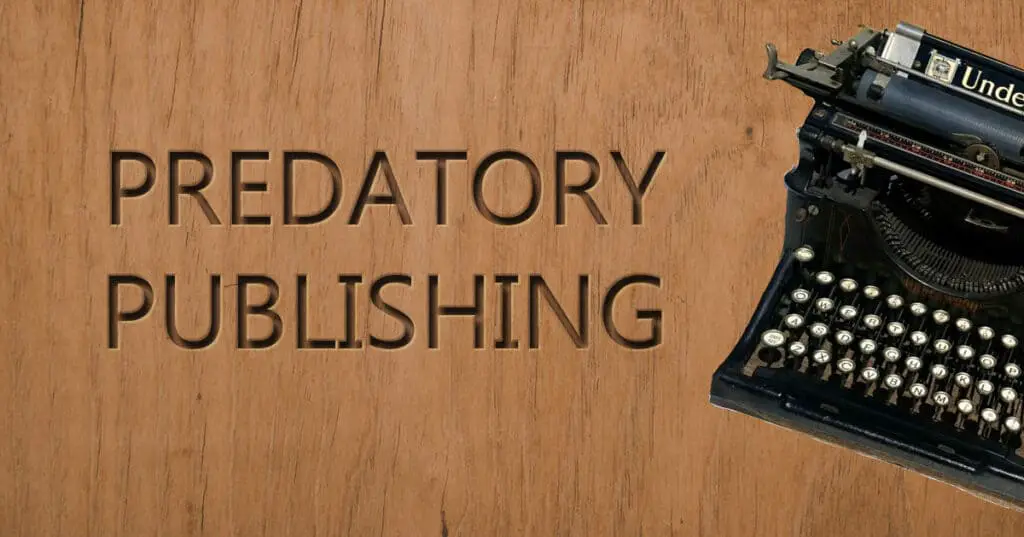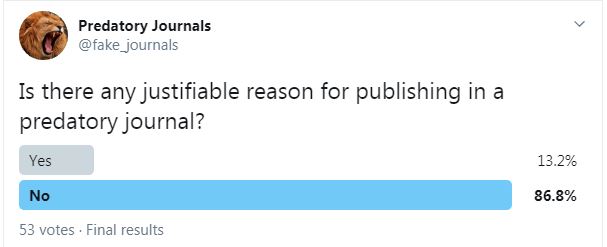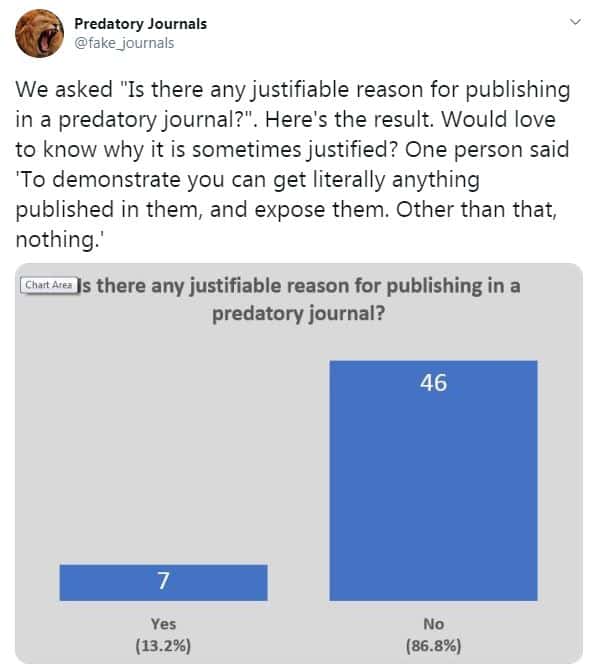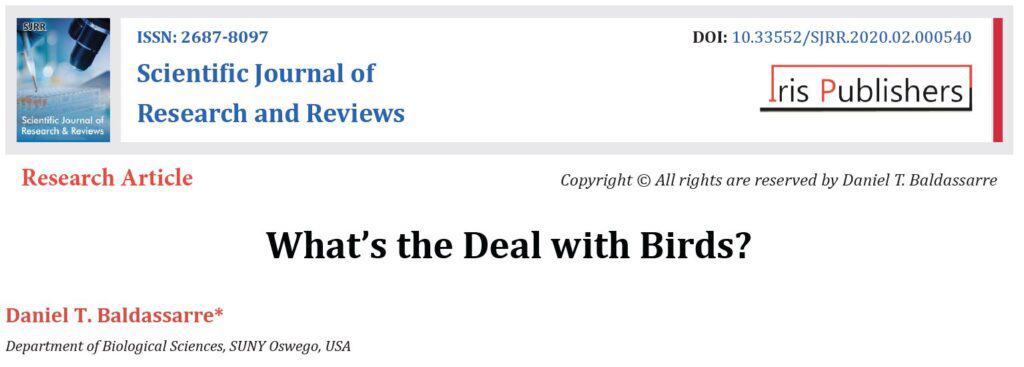Disclosure: This page may contain affiliate links. This means, at no additional cost to you, we receive a commission if you click through and make a purchase.
Financial Analysis
Why would you publish in a predatory journal?
In one of our other blog posts (Why is predatory publishing evil?) we made the case that you should never submit to a predatory journal, yet the poll we conducted does not entirely agree with that view. We stand by the conclusion of our previous article but wonder why some scholars might feel that it is appropriate to publish in a predatory journal?
- “To demonstrate you can get literally anything published in them, and expose them. Other than that, nothing.” We actually found this refreshing. There have been a number of reports of sting operations, with a recent one that we particular like called “What’s the Deal with Birds” (see Figure 3). We would particularly encourage you to look at the Acknowledgements. It is worth accessing the paper just to read those.
- “The fact that they exist means that they are exploiting a gap in the market.” This, of course, is the whole basis for predatory publishing, indeed any business. If there were not a gap in the market, then predatory publishing would not exist.
Unlike other businesses though, the gap in the market is an exploitative model. It preys on those that are either desperate to publish, or those that do not fully understand how scientific publishing really works and believes that their work is being peer reviewed and the articles actually have merit. Their articles may indeed have merit but this cannot be validated by submitting to a predatory publisher.
Moreover, once you have published in a predatory journal and later discovered that the article is not being read or cited, you have wasted the article, and your money, as it is unlikely that you will be able to withdraw it and submit it elsewhere.
- “One possible barrier is individuals not being familiar with the English language.” If a paper is not peer reviewed, it means that anything can get published, no matter how good, or bad, the English is.
Even with legitimate journals, this is a problem. When we review papers (in our day job) we try not to say “The English must be improved” as this must be so demoralizing to the author if they have no way of doing this. Having said that, the English in a peer reviewed scientific paper must be of a good standard, so that the readers can understand it and so that the ambiguity is removed so that the work is reproducible.
If you have the money to pay the Article Processing Charges (APCs) for a predatory journal, we would suggest that the money would be better spent using an English editing service and then sending the paper to a traditional journal where there are no APCs.
However, we would warn against just using an English language service without acknowledging this in the paper. In “Is There a Role for Publication Consultants and How Should Their Contribution be Recognized?“, the authors provide advice and guidance about using an editor. One of the reasons given (and there are many) is that the readers have a right to know whether the English, as written, is solely down to the author(s) as the level of English might be used for decisions such as promotion and hiring.
- “Lack of resources for academics to undertake sophisticated research (this has to be an issue in some countries.” We agree that this is an issue, but it is still not a good reason to submit papers to predatory journals. Indeed, even scholars working in the same country will face variations of this issue. If you are working in a university which is not as well funded as universities in the same country, or where your School/Faculty is not so well funded as others, you will face a variation of this issue. But, this is not a reason to submit to a predatory journal.
It does lead to the question, “So how can I do the research I want to do?” The simple answer is you may not be able to. If you need access to some specific equipment, but don’t have that access, then you can’t do that research. Of course, you could try and collaborate, write a grant proposal, beg, borrow or steal (actually don’t steal), but if the resource is not available, you cannot do the research.
You may need to be realistic about the research that you are able to do and reframe it, so that you can carry out high quality research that is possible within your own capabilities and resources. It might be a difficult choice to change your research area, but this is much more preferable to submitting inferior research to predatory journals. This can only damage your CV, as we discuss in “Will publishing in predatory journals harm your CV?“.
Are there other reasons?
Conclusion
We have said it before, and we say it again. There is never a good reason to publish in a predatory journal. You should not do it.
The only reason when it might be appropriate is for a sting operation, just to prove that the journal is predatory. Even this wastes somebody’s money and gives the predatory publisher some revenue. It could also be argued that you would be better off spending your time writing a legitimate journal article. But, if a sting operation means exposing a journal for what it is, then we would be supportive of doing this. But, ultimately, we want to get to a position where predatory publishers wither on the vine and go out of business.
But, the take home message from this article is that you should never submit to a predatory journal.
| Country | Number of Scholars |
|---|---|
| AUT | 59,911 |
| BEL | 31,069 |
| BRA | 445,514 |
| CAN | 172,490 |
| CHE | 34,446 |
| COL | 146,481 |
| CRI | 11,050 |
| CZE | 18,685 |
| DEU | 407,132 |
| DNK | 17,215 |
| ESP | 167,063 |
| EST | 4,209 |
| FIN | 14,893 |
| FRA | 120,152 |
| GBR | 156,295 |
| GRC | 18,968 |
| HUN | 24,119 |
| IRL | 9,651 |
| ITA | 91,291 |
| JPN | 224,124 |
| KOR | 219,598 |
| LTU | 12,148 |
| LUX | 954 |
| LVA | 7,022 |
| MEX | 387,391 |
| NLD | 68,710 |
| NOR | 33,176 |
| NZL | 16,834 |
| POL | 95,739 |
| PRT | 33,160 |
| RUS | 597,067 |
| SVK | 12,204 |
| SVN | 7,178 |
| SWE | 34,710 |
| TUR | 151,763 |
| USA | 1,581,424 |
| Total | 5,433,835 |
Acknowledgements
The header image is adapted from https://www.flickr.com/photos/number7cloud/33301620478 under Attribution-ShareAlike 2.0 Generic (CC BY-SA 2.0)





